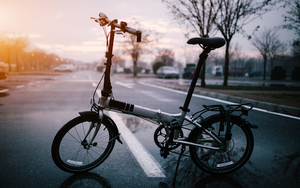Are Electric Scooters Legal on Paths?
Apr 05, 2024
List of Contents
- Are electric scooters legal on paths?
- Understanding electric scooter laws
- The legality of electric scooters on paths
- Safety Considerations for electric scooter use
- Advocacy and future legislation
- Conclusion
Are Electric Scooters Legal on Paths?
In recent years, electric scooters have gained popularity as a convenient and eco-friendly mode of transportation. However, a grey area exists when it comes to their legality on paths. This article aims to provide an in-depth understanding of the laws surrounding electric scooter usage on paths, the safety considerations associated with it, and the potential changes in future legislation.
Understanding Electric Scooter Laws
Before delving into the specifics of electric scooter use on paths, it is important to grasp the basics of the legislation governing these vehicles. Electric scooter laws vary from country to country and even from city to city, making it crucial for riders to familiarise themselves with the local regulations before getting on the road.
The Basics of Electric Scooter Legislation
As the popularity of electric scooters has surged, governments have been forced to address the legal implications of their use on public roads. Many jurisdictions classify electric scooters as "Personal Light Electric Vehicles" (PLEV), subjecting them to specific rules and regulations. These laws typically dictate speed limits, age restrictions, and the requirement of valid licenses and insurance for riders.

Variations in Laws by Country
It's important to note that laws concerning electric scooter usage on paths can vary significantly depending on the country. For instance, in the United States, regulations are often determined at the state or local level, resulting in a patchwork of laws. Some cities allow electric scooters on paths, while others only permit their use on roads or designated bike lanes. In contrast, countries like Germany and France have adopted national regulations that allow electric scooters on paths, provided certain conditions are met.
Recent Changes in Electric Scooter Laws
Due to the relatively new nature of electric scooters, many jurisdictions are constantly updating their legislation to adapt to changing circumstances. For example, in 2020, the United Kingdom introduced new regulations allowing electric scooters to operate on paths and roads, as long as they adhere to certain speed limits and technical requirements. These amendments reflect the growing acceptance and integration of electric scooters into urban mobility systems.

The Legality of Electric Scooters on Paths
One of the most common questions regarding electric scooters is whether they are legal on paths. To answer this, it is necessary to explore the definition of "paths" in the context of scooter laws, the legal implications of riding scooters on paths, and the potential penalties for illegal scooter use.
Defining 'Paths' in the Context of Scooter Laws
In the realm of scooter legislation, paths typically refer to pedestrian walkways, shared paths, or designated cycling routes. The permissibility of electric scooters on these paths often depends on local regulations. In some cities, electric scooters are treated similarly to bicycles, allowing them to be ridden on paths, while other areas strictly prohibit their use in pedestrian zones.
Legal Implications of Riding Scooters on Paths
Riding electric scooters on paths where they are not permitted can have legal repercussions. The specific consequences vary depending on the jurisdiction and can range from fines to the impoundment of the scooter. Riders should familiarise themselves with the local laws and respect designated zones to avoid potential penalties.
Potential Penalties for Illegal Scooter Use
The penalties for unauthorised electric scooter use can be severe, so understanding the consequences is essential. For instance, in some jurisdictions, riders may face monetary fines that can range from a few hundred to several thousand pounds. Repeat offenders may even risk having their driving licenses suspended or facing criminal charges in extreme cases.

Safety Considerations for Electric Scooter Use
While legal implications are a crucial part of the discussion, safety should always be at the forefront when riding electric scooters on paths. This section delves into the safety guidelines for riders, the importance of helmets and protective gear, and safe riding practices to ensure the well-being of both riders and pedestrians.
Safety Guidelines for Electric Scooter Riders
Whether it’s an Inokim Oxo or Swifty One-E, when operating an electric scooter on paths, riders must follow several safety guidelines to minimise the risk of accidents. These include maintaining a safe speed, obeying traffic signs and signals, and yielding to pedestrians. Additionally, riders should avoid distractions such as texting or listening to music, which can impede their ability to react to potential hazards. Within one year, there were over 1,400 collisions involving e-scooters in the UK.
The Role of Helmets and Protective Gear
Wearing appropriate protective gear is vital for scooter riders, especially when sharing paths with pedestrians and cyclists. Helmets, knee pads, and elbow pads can provide critical protection in the event of a fall or collision. Studies have shown that helmets can significantly reduce the risk of head injuries and should be considered an essential piece of equipment for riders of all experience levels.
Safe Riding Practices on Paths
To ensure the safety of all path users, electric scooter riders must adhere to safe riding practices. This includes respecting speed limits, maintaining a safe distance from other path users, and using hand signals to indicate turns or stops. By following these practices, riders can contribute to a harmonious and secure path environment for everyone.
Advocacy and Future Legislation
As the popularity of electric scooters continues to soar, advocacy groups championing the rights of scooter riders and predicted changes in future legislation play a pivotal role. This section explores the advocacy efforts, projected changes in scooter laws, and methods for staying informed about scooter legislation.
Groups Advocating for Scooter Path Rights
Various organisations and advocacy groups are actively working to promote the rights of electric scooter riders on paths. These groups often engage in initiatives such as lobbying for favourable legislation, organising awareness campaigns, and conducting research to support their cause. By joining or supporting these groups, individuals can contribute to the development of more inclusive and scooter-friendly legislation.
Predicted Changes in Scooter Laws
The future of electric scooter legislation is a topic of ongoing discussion and speculation. As governments worldwide recognise the increasing demand for sustainable transportation solutions, it is anticipated that changes in scooter laws will continue to occur. These changes may include provisions for increased path accessibility, standardised regulations across jurisdictions, and improved infrastructure for scooters.
How to Stay Informed About Scooter Legislation
Given the evolving nature of electric scooter laws, staying informed is crucial for both riders and those interested in future developments. To keep up-to-date with scooter legislation, individuals can follow official government websites, subscribe to newsletters or online forums dedicated to electric scooters, or consult local authorities. By staying informed, individuals can ensure their compliance with current laws and actively participate in shaping future legislation.
Conclusion
As the popularity of electric scooters grows, understanding the laws surrounding their usage on paths becomes increasingly important. While regulations may differ from one country to another, riders need to acquaint themselves with local laws to avoid potential penalties. Prioritising safety by adhering to guidelines and wearing protective gear is paramount, ensuring a harmonious and secure environment for all path users. Looking forward, the efforts of advocacy groups and anticipated changes in future legislation will likely contribute to more comprehensive and cohesive electric scooter regulations.






